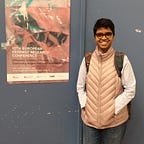Revisiting Dil To Pagal Hai: Understanding unrequited love
There’s a scene in Dil To Pagal Hai (1997), where we see Nisha (Karisma Kapoor) sitting by a lake. Rahul (Shah Rukh Khan) is sitting next to her. We know Nisha’s heartbreak is complete because she has discovered that Rahul is in love with Pooja (Madhuri Dixit), a woman who probably loves him back. When Nisha had earlier confessed her love to Rahul, it had not been reciprocated, but the treatment of that emotionally sensitive moment was not flippant. She had even joked that when she returns from London, Rahul would probably beg for her to take him back, and that she might not be in the mood to say yes to him. Unfortunately, nothing of that sort was in store for Nisha, who’s now also harbouring a pang of jealousy.
Apparently, this particular scene had to be shot a bunch of times because it would always end up raining. But that’s not important, the conversation between Nisha and Rahul is. She wants to be left alone because she’s in pain and is hurting. Rahul however, wants to be by her side because he knows he’s the reason why his friend is hurting, and he’d like to do anything he can to wish away her tears and fears.
In what is common for a person whose love isn’t reciprocated, Nisha too wonders if she’s so bad as to not receive love or be loved. In a movie that would release a few years later (Dil Chahta Hai, 2001), we’d see something similar play out where the lovely Deepa (Samantha Tremayne) is at a beach in Goa, wondering why the turd Akash (Aamir Khan) won’t love her, only for the sensitive Sid (Akshaye Khanna) to come sit next to her, be there for her, and say the most comforting words.
Anyway, back to Dil To Pagal Hai. The conversation between Nisha and Rahul is poignant because the latter makes the former realise that whom we fall in love with is not in our control. Nisha doesn’t like that she’s also feeling jealous, that she’s unable to feel happy for her friend who has found someone nice and genuine for himself. She breaks down, saying, “Main buri hun” (I’m a bad person), and your heart breaks along with hers because you can see that the hurt is real. It’s here that Rahul comforts his friend, telling her that it’s actually the ‘one above’ who’s the bad one; it’s He who tests people and their emotions. And now that she’s found someone else to blame for the feelings that she thinks are wrong, Nisha gets up to throw stones at the sky, crying, “Tum bure ho. Tum bure ho. Main buri nahin hun” (You’re bad, not me).
Even as she’s repeating herself, Rahul apologises to Nisha. He’s sorry that he’s unable to reciprocate Nisha’s love in the way she’d like. He’s sorry that he couldn’t help falling in love with Pooja. He’s sorry that he’s the inadvertent reason that Nisha is in tears. She doesn’t want to hear the apology because it would only make her feel weaker, but for me, this was extremely touching. Here’s someone who’s the reason for your heartbreak, who truly understands that feeling, and knows it’s important to be a good friend and stand by you.
It’s so rare to see one-sided love being handled with such sensitivity, particularly on celluloid. I’d like to credit Yash Chopra for directing this scene with the right amount of vulnerability, and indeed to Karisma Kapoor and Shah Rukh Khan for their perfectly platonic chemistry. It felt just right.
Nisha perhaps needed Rahul to help her through her heartbreak, to gain a semblance of closure. Rahul needed to apologise to Nisha for breaking her heart, bringing her to tears, and for knowing she was always in love with him, but he never was.
That they were able to move forward from unrequited love, that their friendship stayed just as strong, perhaps even stronger is, for me, a sign of hope. It’s a moment of learning — Yash Chopra teaches us that humans can’t play God, he teaches us that we must love without any expectation, we must love from our soul, from the depths of our heart, because when we’re in love, we’re the most alive. So whether or not someone somewhere is made for us, whether or not the immortal has made every mortal in pairs, we do feel happy when we see what love is capable of.
Therefore, it only made sense for Nisha to thank Him — the one she was only recently angry with — when her best friend’s love was reciprocated. There’s power even in unrequited love.
